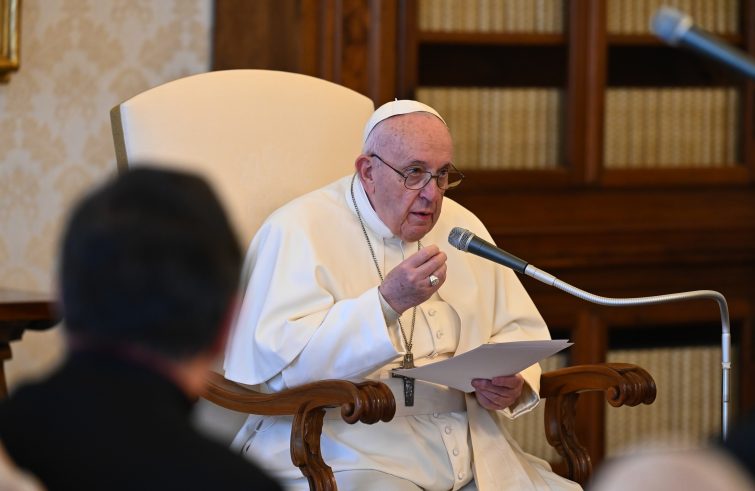
“Teach us how to pray”, the disciples asked Jesus, and Jesus taught them a vocal prayer: the Lord’s Prayer. And everything is there, in that prayer…”, the Pope said in unscripted remarks at today’s general audience live streamed from the Private Library of the Apostolic Palace. “The first human prayer is always a vocal recitation”, Francis noted: “The lips always move first. Although we are all aware that praying does not mean repeating words, vocal prayer is nevertheless the surest, and can always be practised. Feelings, on the other hand, however noble, are always uncertain: they come and go, they leave us and return. Not only that, but the graces of prayer are also unpredictable: at times consolations abound, but on the darkest days they seem to evaporate completely. The prayer of the heart is mysterious, and at certain times it is lacking.” “Instead, the prayer of the lips that which is whispered or recited chorally is always accessible, and is as necessary as manual labour”, Francis said quoting from the Catechism of the Catholic Church.
The example given is that of the elderly who recite quietly in church the prayers they learned as children: “hat prayer does not disturb the silence, but testifies to their fidelity to the duty of prayer, practised throughout their lives without fail.
These practitioners of humble prayer are often the great intercessors in parishes: they are the oaks that from year to year spread their branches to offer shade to the greatest number of people.
Only God knows when and how much their hearts have been united to those prayers they recited: surely these people too had to face nights and empty moments. But one can always remain faithful to vocal prayer.” “It is like an anchor”, the Pope remarked: “one can hold on to the rope and remain, faithful.”
“We all have something to learn from the perseverance of the Russian pilgrim,
mentioned in a famous work on spirituality, who learned the art of prayer by repeating the same invocation over and over again: ‘Jesus Christ, Son of God, Lord, have mercy on us, sinners!’” At the end of the audience, the Pope mentioned the book that tells the story of a Russian pilgrim, a famous ascetic text written sometime between 1853 and 1861 by a man called Nemytov, a Russian peasant or merchant, recommending reading it to understand what vocal prayer is. “If graces arrive in our life, if prayer becomes so warm one day that the presence of the Kingdom were perceived here among us, if that vision could be transformed until it became like that of a child, it would be because we have insisted on reciting a simple Christian exclamation”, Francis said: “In the end, it becomes part of our breathing.”
“Please! Do not succumb to the pride of scorning vocal prayer”,
is the Pope’s appeal: “It is the prayer of the simple, the prayer that Jesus taught: Our Father, who is in heaven…’ The words we speak take us by the hand; at times they restore flavour, they awaken even the sleepiest of hearts; they reawaken feelings we had forgotten. And they lead us by the hand towards the experience of God, these words… And above all, they are the only ones that, in a sure way, direct to God the questions he wants to hear. Jesus did not leave us in a fog. He told us: ‘Pray then like this’. And he taught the Lord’s Prayer.”
“We create words, but they are also our mothers, and to some extent they shape us”,
is the statement formulated in the opening of the catechesis: “Words are born from feelings, but there is also the reverse path, whereby words shape feelings. The Bible educates people to ensure that everything comes to light through the word, that nothing human is excluded, censored. Above all, pain is dangerous if it stays hidden, closed up within us…”.
“Pain closed up within us, that cannot express or give vent to itself, can poison the soul. It is deadly”,
Francis added in unscripted remarks: “None of us are born holy, and when these negative feelings come knocking at the door of our hearts, we must be capable of defusing them with prayer and God’s words.” “The sacred writers do not want to deceive us about the human person: they know that our hearts harbour also unedifying feelings, even hatred”, the Pope remarked.
“In the face of violence, no words existed to make negative feelings harmless, to channel them in such a way that they do no harm, then the world would be overwhelmed.”









